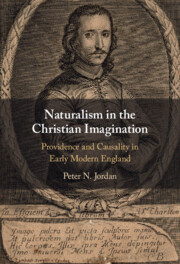Book contents
- Naturalism in the Christian Imagination
- Reviews
- Naturalism in the Christian Imagination
- Copyright page
- Dedication
- Contents
- Acknowledgements
- Part I Setting the Scene
- Part II Expanding the Explanatory Scope of Natural Causality
- Chapter 3 Chance, Lots, and Games
- Chapter 4 Prodigies
- Part III Curtailing the Explanatory Ambitions of Naturalistic Philosophies
- Part IV Conclusion
- Bibliography
- Index
Chapter 3 - Chance, Lots, and Games
from Part II - Expanding the Explanatory Scope of Natural Causality
Published online by Cambridge University Press: 30 June 2022
- Naturalism in the Christian Imagination
- Reviews
- Naturalism in the Christian Imagination
- Copyright page
- Dedication
- Contents
- Acknowledgements
- Part I Setting the Scene
- Part II Expanding the Explanatory Scope of Natural Causality
- Chapter 3 Chance, Lots, and Games
- Chapter 4 Prodigies
- Part III Curtailing the Explanatory Ambitions of Naturalistic Philosophies
- Part IV Conclusion
- Bibliography
- Index
Summary
This chapter looks at chance-based gambling activities like dice and lots. Early modern Protestants thought gambling through such instruments was a widespread societal problem. This chapter analyses competing accounts of how these activities should be understood. It focuses on Thomas Gataker’s deployment of a more naturalistic alternative to the supernaturalistic approaches that some of his fellow Protestants, such as James Balmford, were using to fight back against the problem. Gambling activities may not seem like the other kinds of phenomena in nature studied elsewhere in the book, but to early modern thinkers they involved very similar causal mechanisms to many other kinds of occurrences in nature. They therefore shed considerable light on how Christians at the time thought about and explained many kinds of phenomena in nature.
- Type
- Chapter
- Information
- Naturalism in the Christian ImaginationProvidence and Causality in Early Modern England, pp. 49 - 71Publisher: Cambridge University PressPrint publication year: 2022

